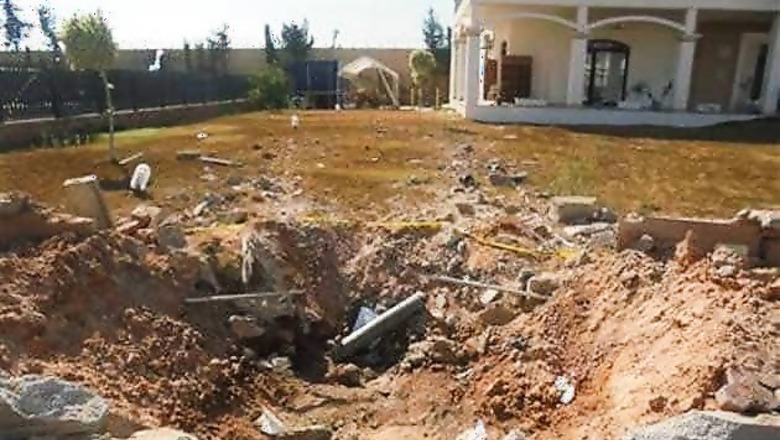
views
Tripoli: An Islamist-allied militia group in control of Libya's capital now guards the US Embassy and its residential compound, a commander said Sunday, as onlookers toured the abandoned homes of diplomats who fled the country more than a month ago.
Witnesses saw holes left by small-arms and rocket fire dotting the residential compound, reminders of weeks of violence between rival militias over control of Tripoli that sparked the evacuation.
The breach of a deserted US diplomatic post - including images of men earlier swimming in the compound's algae-filled pools - likely will reinvigorate debate in the US over its role in Libya, more than three years after supporting rebels who toppled dictator Moammar Gadhafi. It also comes just before the two-year anniversary of the slaying of US Ambassador Chris Stevens and three other Americans in Libya.
A commander for the Dawn of Libya group, Moussa Abu-Zaqia, said that his forces had been guarding the residential compound since last week, a day after it seized control of the capital and its international airport after weeks of fighting with a rival militia. Abu-Zaqia said the rival militia from Zintan was in the compound before his troops took it over.
A senior State Department official, speaking on condition of anonymity because the official was not authorized to discuss the issue publicly, said the department is seeking additional information but believed the embassy compound "remains secure."
The official said the US had moved embassy staff from Tripoli to Valletta, Malta, because of "ongoing fighting between militias occurring very close to our compound." Those personnel "remain engaged," the official said, while the State Department continues to work with the Libyan government.
Some windows at the compound had been broken, but it appeared most of the equipment there remained untouched.
Some papers lay strewn on the floor, but it didn't appear that the villas in the compound had been ransacked.
Hassan Ali, a Dawn of Libya commander, said his fighters saw "small fires and a little damage" before they chased the rival Zintan militia out of the residential compound.
"We entered and put some of our fighters to secure this place and we preserved this place as much as we could," he said.
Abu-Zaqia said his militia had asked cleaners to come to spruce up the grounds.
He added that the US Embassy staff "are most welcome in God's blessing, and any area that is controlled by Dawn of Libya is totally secure and there are no troubles at all."
Another Dawn of Libya commander, who spoke on condition of anonymity as he wasn't authorized to speak by his leaders, told the AP that the U.S. Embassy, about a kilometer (half a mile) away, also was under guard by his militiamen.
"We've secured the location and the assets of the embassy," he said. "We've informed our command ... immediately after entering the place following the exit of the rival militia. The place is secure and under protection."
The commander did not elaborate and the AP journalist could not reach the embassy. The Dawn of Libya militia is not associated with the extremist militia Ansar al-Shariah, which Washington blames for the deadly assault on the U.S. Consulate in Benghazi on Sept. 11, 2012, that killed Stevens and the three other Americans.
A video posted online Sunday showed unarmed men playing in a pool at the compound and jumping into it from a second-story balcony. In a message on Twitter, US Ambassador to Libya Deborah Jones said the video appeared to have been shot in at the embassy's residential annex, though she said she couldn't "say definitively" since she wasn't there.
"To my knowledge & per recent photos the US Embassy Tripoli chancery & compound is now being safeguarded and has not been ransacked," she wrote on Twitter. She did not immediately respond to a request to elaborate.
Typically, local forces provide security for diplomatic posts, but Libya's government has largely relied on militias for law enforcement since Gadhafi's ouster, as its military and police forces remain weak. In the past several weeks, the security vacuum in Tripoli deepened as militia violence worsened and the diplomatic security provided by Libya's Interior Ministry in the area apparently fled as well.
It remains unclear who the U.S. left in control of guarding its facilities after its personnel evacuated under military escort on July 26. The State Department has said embassy operations would be suspended until the security situation in Libya improved.
Libya's militias, many of which originate from rebel forces that fought Gadhafi, have become powerful players in post-war Libya. Successive governments have put militias on their payroll in return for maintaining order, but rivalries over control and resources have led to fierce fighting among them and posed a constant challenge to the central government and a hoped-for transition to democracy.
The militia violence began after Islamist candidates lost parliament in June elections and a renegade general began a military campaign against Islamist-allied militias in Benghazi, Libya's second-largest city. Now, Libya has two competing governments and two parliaments, deepening divisions and escalating the political struggle that's torn the country apart.

















Comments
0 comment